
“We were challenged to re-imagine how leadership works to increase equity and improve outcomes for the population we serve.”
-Ariele Belo

Co-Director
ID: Lindsay wearing grey blazer over black turtleneck.
What’s happening right now at HSDC?
Lindsay: HSDC has had a lot of changes over the years, but this one is a doozy. We are shaking things up. Leadership needs to be equitable and reflect the values of the community we serve in order to be successful. We have hired long-time staff member Ariele Belo to step into a newly created, Co-Director position. We will lead our organization together. This leadership model dramatically shifts away from hierarchical leadership where power is stored at the top and begins an exploration into collaborative leadership where power is shared.

Co-Director
ID: Ariele wearing black top.
Why Do This?
Ariele: We were challenged to re-imagine how leadership works to increase equity and improve outcomes for the population we serve. We were and are living in bold times. Bold times require bold action. We are also challenged to look at our values. If we are to be more equitable as an organization and in our leadership we need to make sure our values align and support this effort.
The other piece to this is: HSDC’s mandate is very broad and we serve a population from birth onward. We can’t do it all under one person. We talk about HSDC as a ship sometimes. This ship is too big and we have too far to go to rely on one captain to steer it. Our mandate and scope will be better served and achieved with two at the helm.
Lindsay: We can’t keep doing the same thing over and over again and expect different results. We also can’t keep losing our leaders and our talent due to burnout. One of the clearest indicators of this is what we see out in the field in terms of burnout- the rates of leaders in nonprofits experiencing burnout and leaving the field are extraordinarily high. I’m really passionate about this. This burnout rate is higher for nonprofit leaders that in the for profit industry. This burnout hits women more than men and BIPOC members more than Caucasian, or white, employees. The data shows us that sustainable leadership can no longer depend on a single person to do this work over the long term. It is a better use of resources to invest in a two-leader model to not only reduce burnout, but also to pool resources, leverage different types of knowledge, broaden the representation of leadership, and to also act as a buffer in the event someone leaves- there is someone already there keeping this ship afloat.
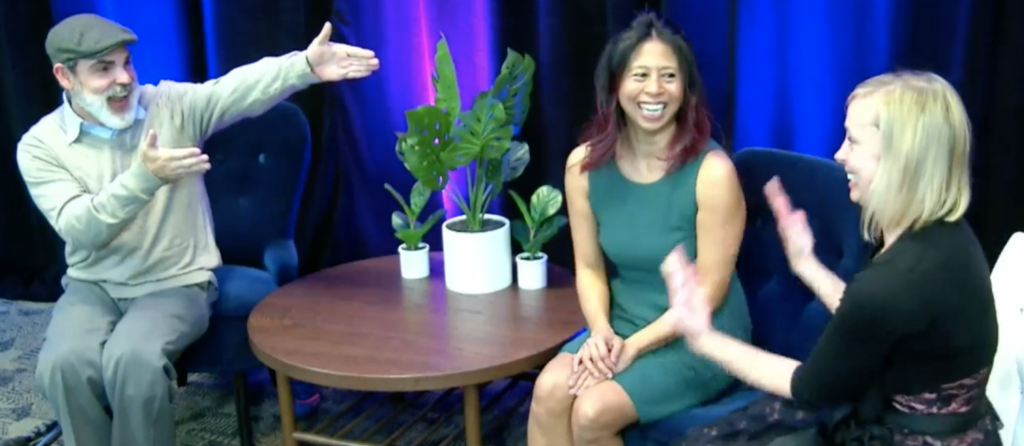
ID: Left to Right- Buddy, a white male with grey beard and hair, wearing a tweed news cap, camel sweater over blue shirt and grey pants, signing “TADA” to Ariele and Lindsay on right. Ariele, wearing teal dress and Lindsay, wearing black cardigan over black dress. All of them are sitting on blue chairs. Round brown table with few plants between Buddy and Ariele. Pink, blue and purple background.
Why Now?
Ariele: This journey began two years ago. The world was on fire and still is. Black Lives Matter has gained long overdue recognition. The pandemic hit, affecting folx from all walks of life but especially our community. We recognize our BIPOC DeafDisabled, DeafBlind, Deaf, and Hard of Hearing community members are especially impacted by lack of access, compounding the experience of racism and system inequities. That’s where we need to step up; We are called to do things differently. We are committed to doing things differently through changes that are visible and have a real systemic impact. The pandemic and Black Lives Matter brought into sharp focus that this absolutely must be an explicit priority for our organization.
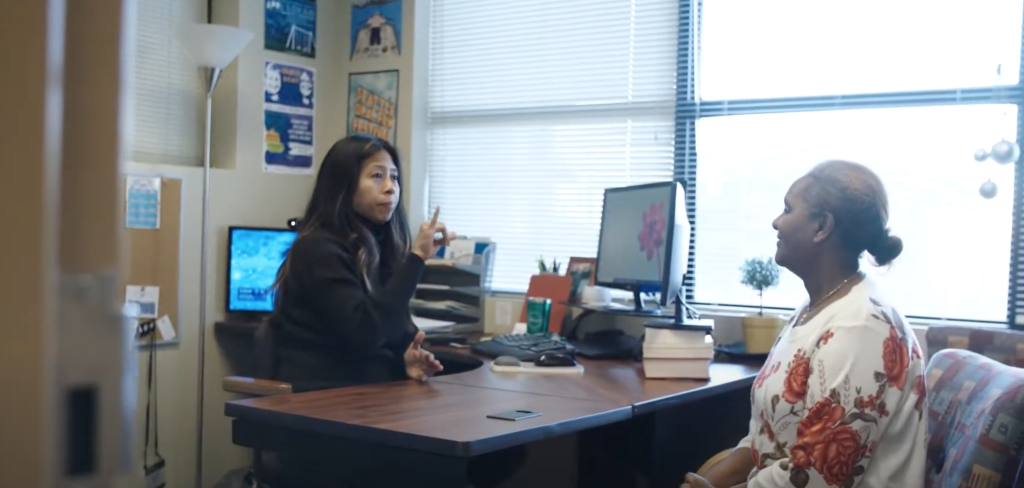
ID: Ariele, wearing black turtleneck, interacting with a black woman with black hair pulled back in a bun and white sweater with red flowers pattern, seated across from her in the office.
Lindsay: There is a lot to steer this organization through. One concrete example of what is not working and what needs to change course, before the pandemic hit, we had over fifty staff and in 2020/2021 this dipped to thirty-five. Whether people left due to burnout or for other reasons, clearly we need to do things differently. Sixty-eight percent of the people Deaf and Hard of Hearing Services provides services to are BIPOC, and our staff needs to reflect this if we truly want to be representative of the community we serve. We need to make our agency a place where clients can come to feel safe and supported and make sure this is a workplace where people thrive as employees and as human beings, committed to making this world a better place.
How Did You Create this Model?
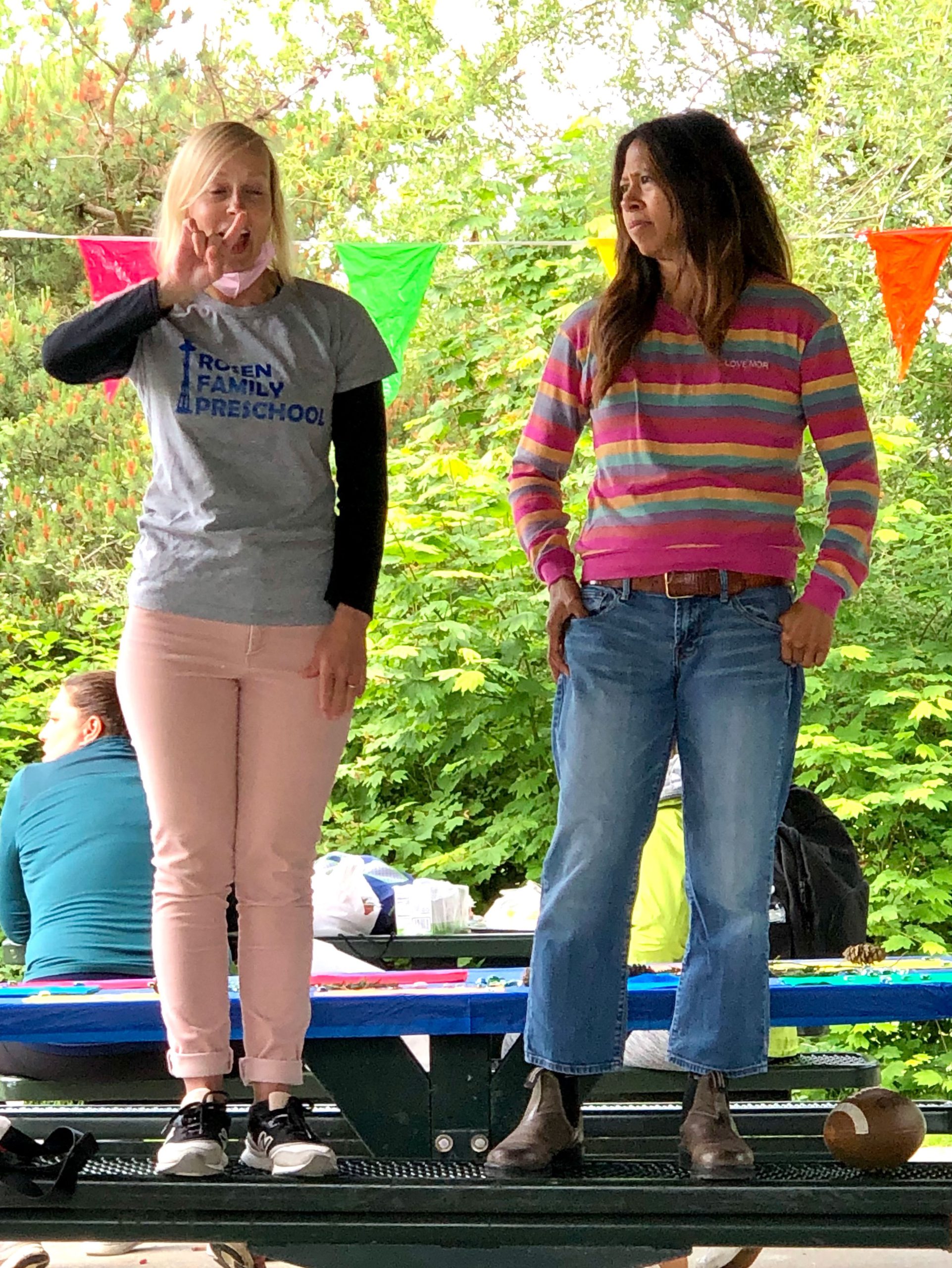
ID: Lindsay on left, wearing a grey t-shirt over black long sleeve tee and pink pants. Ariele on right, wearing multi-colored stripes sweater and blue jeans. They both are standing on a bench.
Lindsay: That’s the thing, we didn’t! It was already there, right in front of us. Deaf Services gives us many of the answers we have to these big challenges HSDC faces. We are so lucky to serve a population that provides a beautiful built-in model of what collaborative leadership looks like and how it can be successful. We are also lucky to have Deaf Services under the stewardship of Ariele for the last twenty years. She has always had a front-row seat to what works and what doesn’t.
Ariele: This wasn’t a decision we made, this is what we were called to do by the community telling us what needs to happen. And our community is broad and comprises people from all walks of life across 13 counties in Washington state, giving us a truly clear, thorough insight into what we need to do to be better.
How is This Going to Work?
Ariele: The best way we can explain it is a three-pronged leadership model: leading from the front, leading from the back, and leading side by side. There will be times when one of us takes the lead in things and in other things, leads from behind supporting the efforts of our co-director.
Lindsay: And then there will be times, many times, when we will both need to be in the room, leading side by side. No matter how we are leading together, front/back/side by side, we will always be leading together. Divide duties by a strength-based approach to leadership.
Ariele: Having the ability to leverage each other’s strengths and areas of expertise will strengthen HSDC in ways we couldn’t before because of the constraints of a hierarchical one-leader model.
What does it feel like to be in these shoes, to come full circle as a PIP graduate and now as the Co-Director of the same agency all these years later?
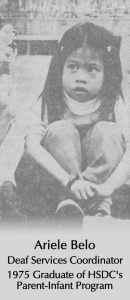
Ariele: I like to challenge myself. I owe a lot of thanks to the Parent Infant Program, which everyone lovingly refers to as PIP for short; this helped my parents when I was a child and supported them. I am also grateful to the family doctor who reassured my parents that having a Deaf child wasn’t a bad thing, there were services out there, and everything was going to be okay, and then he connected them to PIP. I’m also appreciative of all the other families who supported my parents when I was in PIP. Because of all of this, my parents knew I could do anything and encouraged me to challenge myself, push myself higher, and stay involved. I have always known the importance of education, politics, and being informed about what’s happening in the world and what is going on out there. And like my parents, it has always been important to me.
Lindsay: I just want to add how much we owe our PIP Specialists and everyone who has been involved in the early childhood education program over the years. Their work makes a difference. It is so gratifying to see. I love that Ariele is just as passionate about PIP as I am and just as committed to ensuring its continuation and success. And now we have an additional program, The Rosen Family Preschool, that didn’t exist when Ariele was in the PIP program. We know that by continuing to build upon a solid foundation of language, American Sign Language and English, people can thrive, and not only will our children be kindergarten ready they will be community ready.
How will you fund two positions?
Lindsay: We of course have to be mindful of how we use our resources. We are a nonprofit. We don’t want to duplicate services. But we would be remiss not to take advantage of Ariele- her great passion, vision, experience, and education. It would be a mistake not to use these things in bigger ways.
Ariele: This is where you come in. As community members, stakeholders, funders, and as donors.
There are many things we would like to do, many opportunities exist for HSDC to support the community as well as our staff.
- Increasing program resources is an important area of focus.
- Focusing on our human resources is equally important; we will be working towards equitable pay for our staff as a starting point. If we want to be a more equitable agency we need to ensure our staff can afford to live in the Puget Sound region.
- We are shifting priorities to ensure that we are collaborating with other agencies. We have to. We can’t do it all. We don’t have enough resources. We must work smarter and we must work together.
There are many things we would like to do, many opportunities exist for HSDC to support the community as well as our staff.
Lindsay: We need more funding so we can support the system; we are nonprofit and so everything we bring in, that money goes right back into the community in the form of direct services and resources. That’s the entire purpose of our organization, to have services available and to serve the community. We can serve better when we have better-funded programs and well-paid staff. And many of the challenges we face as an organization can be solved by adding more people and placing them in the right place. We are united in this goal, ensuring that everyone who comes through the door is treated fairly and I can’t say this enough, this includes our own staff.
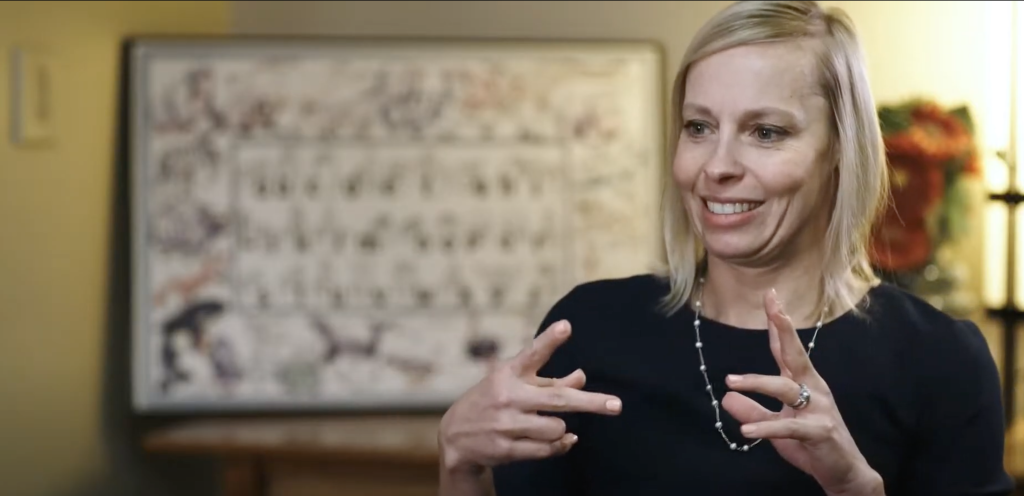
ID: Close up of Lindsay, wearing black top with pearl necklace, sitting in an office.
What is your biggest dream for HSDC?
Ariele: I have two that are important to me. One is that HSDC is a place where not only do clients receive equitable services but the staff is receiving equitable pay. Two, I want us to hone in on the issues that are affecting our community and take action at the legislative level. We need to be directly involved in policy-making. We need to be talking to the legislature. We need to be a part of getting bills to the floor. We need to make sure that every single piece of legislation about our community is done with our community’s best interest in mind and is representative of our community and is appropriately addressing community needs; the best way we can do this is to make sure that information is accessible to our community members and is shared with them.
Lindsay: My goals are the same as Ariele’s. On the immediate horizon is getting our strategic plan ready for implementation. Hire more diverse staff. We also know there are many missed opportunities at the legislative level that HSDC needs to take more initiative with and become more aware of when politicians and legislature are pushing policies that make a difference in our community and or actively creating policy that harms it. While we cannot lobby, we do owe our community information and education on what is happening so they can be better informed and get involved!
Thank you, Lindsay and Ariele! If you would like to reach our Co-Directors you may email them at: [email protected] or [email protected].

One comment on “New Director Announcement: Interview with Co-Directors Ariele Belo & Lindsay Klarman”
I am excited for Ariel, Lindsay, HSD staff and many clients. I’ve known both women over the years, Ariel for many more, and can’t say enough high praise for them. Congrats to you all for figuring this out.